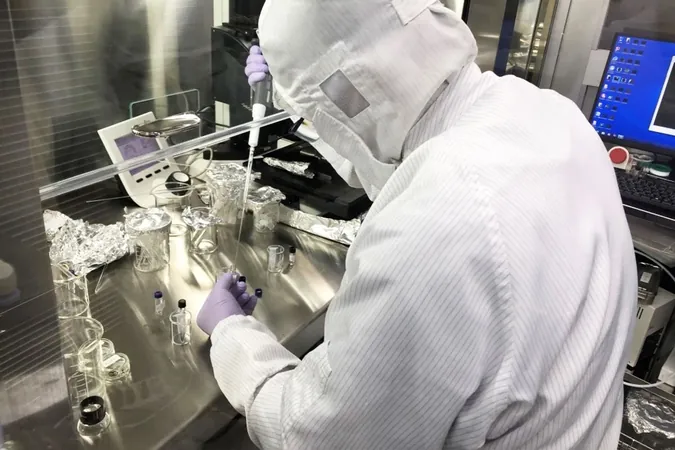
Shocking Twist: Asteroid Bacteria Debunked as Earth-Based Contamination!
2024-11-24
Author: Wei
Introduction
Scientists and space enthusiasts were set abuzz with excitement after the discovery of water and RNA-like compounds on a rock from the asteroid Ryugu. For many, this seemed like the long-awaited proof of extraterrestrial life. Hopes soared as evidence of potential microorganisms hinted that life could thrive beyond our planet.
Groundbreaking Study
However, a groundbreaking study published in the journal Meteoritics and Planetary Science has dampened those expectations. Researchers have concluded that the microbes detected on Ryugu almost certainly originated from Earth rather than outer space. This revelation emerged from meticulous testing of a sample collected by Japan's Hayabusa 2 mission, which trekked an astonishing 186 million miles to bring back cosmic materials for analysis.
Research Findings
Matthew Genge from Imperial College London led the investigations and found no definitive signs of extraterrestrial microorganisms in the samples. Instead, what appeared to be organic compounds were identified as contaminants from Earth. The study emphasizes a startling reality: "The presence of terrestrial microorganisms within a sample of Ryugu underlines that microorganisms are the world's greatest colonizers and adept at circumventing contamination controls," the authors stated.
Cautionary Tale
This study serves as a cautionary tale in the ongoing search for life beyond our planet. It's not the first instance where initial findings suggested extraterrestrial life, only for subsequent examinations to call those claims into question. In 2020, scientists were thrilled by the detection of phosphine in the atmosphere of Venus—an indication that anaerobic bacteria may exist there. However, further analyses revealed the initial findings were misinterpretations.
Implications for Future Research
The recent findings regarding Ryugu highlight the resilience of Earth-bound microorganisms. "The discovery emphasizes that terrestrial biota can rapidly colonize extraterrestrial specimens even given contamination control precautions," the authors warned, stressing the importance of rigorous testing to ensure the integrity of samples returned from space missions.
Conclusion
As scientists continue to explore the cosmos in the hope of finding extraterrestrial life, this latest revelation underscores the challenges posed by contamination and the need for caution in interpreting our findings. Will we ever find definitive evidence of life beyond Earth? Only time—and more thorough research—will tell!



 Brasil (PT)
Brasil (PT)
 Canada (EN)
Canada (EN)
 Chile (ES)
Chile (ES)
 España (ES)
España (ES)
 France (FR)
France (FR)
 Hong Kong (EN)
Hong Kong (EN)
 Italia (IT)
Italia (IT)
 日本 (JA)
日本 (JA)
 Magyarország (HU)
Magyarország (HU)
 Norge (NO)
Norge (NO)
 Polska (PL)
Polska (PL)
 Schweiz (DE)
Schweiz (DE)
 Singapore (EN)
Singapore (EN)
 Sverige (SV)
Sverige (SV)
 Suomi (FI)
Suomi (FI)
 Türkiye (TR)
Türkiye (TR)